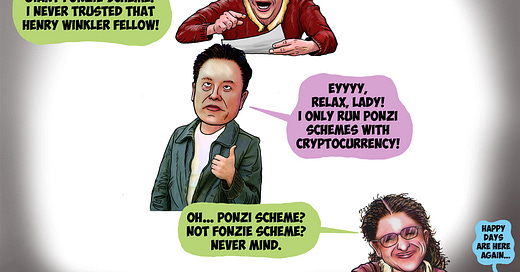This is as close as I come to producing fumetti, which you’d not point to on the Olive Garden menu and proclaim, “Oooh, this looks yummy!” You’d be equally disappointed at more authentic Italian eateries, too.
Borrowing is a polite way of saying, “I took a shortcut.”
By the Americanized definition, fumetti is sequential art storytelling—comics, if you will—that employ photographs and word balloons.
In a perfect world where I had time to practice accurate celebrity caricature and still meet the deadline, Gilda Radner and Elon Musk would be much more stylized than the photo references I used in this cartoon. But what you see is not merely tracing, and that’s it. I have incorporated some departures from the online photos I “borrowed,” but not as much as I would like.
For instance, the heads were enlarged in relation to the bodies because we don’t focus on recognizing Radner’s or Musk’s body like we do (or did) Arnold Schwarzenegger’s. However, I must admit that Arnold’s face is as well known as his pecs and biceps.
I also overfrizzed Radner’s hair because, like Emily Litella, the scatterbrained, hard of hearing SNL character didn’t give a hoot about looking good. She just wanted her opinions to be heard.
The reference for Elon is a composite of an actual Elon photo and a photo of “The Fonz,” whose poses lined up nicely. I added cartoony eyes looking up at Radner to emphasize that his words replied to her initial accusation.
So that’s it for my apologies. I could not escape the idea that Ponzi and Fonzie would be fun to explore.
What’d you say?
Similar to Emily, I have severe hearing challenges. I’ve been deaf in my left ear since childhood, and my good ear — that’s a relative term— is moderately compromised. Consonant discrimination is a massive problem for me, as is separating one-on-one conversation from background din and other discussions.
I have spent a small fortune on hearing aids over the past fifteen years, hoping that technology keeps improving, and the advances have been significant. Hearing aids help, but it’s not like wearing corrective lenses for eyesight problems. You have to wear aids constantly to retrain your brain. In the process, you become dependent on hearing aids, which I suppose is not unlike those of us who depend on pharmaceutical wonders to keep us going.
Instead of bemoaning my situation, I try to laugh with others as I have laughed at Emily Litella. I’m a cartoonist and live to find humor in the open and hiding under rocks. My real life is full of Emily Litella moments, and fortunately, my eyesight is not near as bad as Mr. Magoo’s. One messed-up sensory input is enough!
Being good at something bad is good.
A Substack colleague, who may or may not reply here, shared an observation when he first explored Substack. He noted that problem solvers appeared to have large subscription bases. I never thought much about it; I just wanted to find an outlet and cultivate a following that appreciated my work. The only problem I might solve is alleviating someone’s ennui.
My colleague also told me something that has stuck with me. He said, “Do you know how to make a fortune during a gold rush?” “Sell shovels!”
I am exploring the idea that I am an expert in being partially deaf. It’s not so severe that I can only communicate through sign language (I can’t) or the written word. However, it’s challenging enough that everyday conversations and listening to music become unpleasant and fatiguing experiences. I’m sure millions are similarly affected.
Maybe, just maybe, that could be the basis of a new Substack newsletter. I welcome your naming suggestions!






Name for your solutions Stack? Why over think it? How about "Hardly Hearing"? Tagline: "What's that you say?" (Love Emily Litella and her puppet master, Gilda. Great stuff Frank. Keep it coming love. (KC and the Sunshine Band))
fwiw I don't solve problems either; I'm here for the entertainment. Growing up in Hollywood I ran into Henry Winkler once with my parents at our favorite Chinese Restaurant. We left him alone.